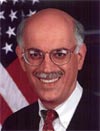
A whopper of an op-ed by Andrew Natsios today, criticizing the Obama administration on Sudan. It is hard to know where to start. Perhaps the most egregious argument by Natsios is that:
U.S. use of the term "genocide" is reducing our diplomatic options. In the face of genocide, the United States could hardly act as a neutral mediator. No politician wants to explain why he or she remained complacent in the face of slaughter.
Hmmm. Perhaps Mr. Natsios, from his perch at Georgetown, has been having a bit of trouble recalling his own involvement on Sudan. The president under whom he served, George Bush, declared Darfur a genocide on June 2, 2005, yet both Natsios and Bush remained largely complacent despite this declaration, and the Bush administration – acting as a “neutral mediator” – was very heavily involved in the disastrous Darfur Peace Agreement signed on May 5, 2006 with U.S. representatives to the talks strong-arming rebel groups to accept the deal.
There is also something morally repugnant about Natsios and others who argue essentially, “Ok, the genocide is over now, let’s move along.” They make it seem as if the only problem with genocide is the social awkwardness it creates for diplomats rather than the immense suffering inflicted on innocent civilians or the need to secure lasting justice.
Yes, the death rates in Darfur have slowed dramatically from their peak in 2003 and 2004, but that is in part because the government of Sudan and the Janjaweed succeeded in killing hundreds of thousands and driving millions from their home – unable to return to this day. While far fewer people die today because of guns and bombs, how many lives are cut short because these millions of people are trapped in squalid refugee and IDP camps?
Natsios also takes a quote by my colleague John Prendergast out of context. John, at a public lecture, had simply noted that arriving at accurate figures of the dead was incredibly difficult because the government of Sudan has made such essential fact finding almost impossible. Natsios uses this to make a case that deaths in Darfur are only around 250,000 in total and that “wild estimates are compromising American diplomacy.” Again, Natsios doesn’t see the killings as the root problem, or the fact that aid agencies and mortality experts can’t operate on the ground as the problem, rather that all this is making it hard for diplomats. The number of those who have died is complex and confusing, but it is far too many by any estimation. For more on this, see the new book, Darfur and the Crime of Genocide, by John Hagan and Wenona Rymond-Richmond, drawn from interviews with more than 1,000 Darfuris, that suggests that about 400,000 Sudanese have been killed.
The op-ed also rather oddly criticizes the Obama administration for focusing on Darfur at the cost of the North-South issue on the same day the administration is convening a high-level conference in Washington, D.C., on the Comprehensive Peace Agreement. We have not been shy in criticizing the approach of the administration when it deserves it, but Natsios criticizing Obama’s approach to Sudan is akin to Don Rumsfeld coming out of retirement complaining that the administration is handling Iraq poorly.
Natsios also laments that the pesky genocide issue is making it hard for U.S. diplomats to meet directly with Bashir, asking, “How do you mediate a peace agreement if you can’t speak to one side’s leader?” One doesn’t have to go far back to find the answer. In 1999, the United States reached a peace agreement during the middle of the Kosovo war with President Slobodan Milosevic, who was facing a war crimes indictment at that time. No U.S. diplomats met directly with Milosevic during the lengthy negotiations to resolve the conflict once the indictment was announced, and negotiations were handled through a very skilled set of proxies. Such a basic failure to understand the mechanics of diplomacy goes a long way in helping explain why Natsios’ tenures as both Special Envoy to Sudan and USAID administrator were so often marked by failure.
Photo: Former U.S. Special Envoy to Sudan Andrew Natsios

